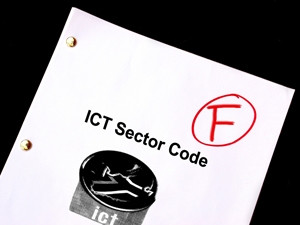
The ICT charter - which was 10 years in the making - will soon be a requirement of the past as it is set to be repealed at the end of October, forcing ICT companies to comply with the generic codes.
This week, trade and industry minister Rob Davies issued a gazette that requires all sector codes to be aligned with the amended broad-based black economic-empowerment codes, which came into effect this month.
In the gazette, Davies said sector codes that are not aligned with the reworked generic codes by the end of October shall be considered for revocation. However, because the Department of Telecommunications and Postal Services has yet to appoint an ICT charter council, the charter will not be amended in time for this deadline.
As a result, companies in the ICT sector will now have to comply with the generic codes, say commentators.
No chance
Inforcomm CEO Andile Tlhoaele explains the council needs to be in place before the charter, which came into effect three years ago, can be amended. However, the latest step in getting this council off the ground was a November 2014 request for nominations. So far, nothing else has been done, and the department has not responded to a request for comment on where the council is, or what will happen to the charter.
Adrian Schofield, who was involved in the early stages of drafting the charter, says the chances of the charter being amended in time are "nil, or less than nil".
"Unless a properly mandated and resourced council is put in place immediately, there is no hope of a fair process that can align the codes in the charter with the new codes. There needs to be time to identify the issues, consult with stakeholders, propose and refine the changes required, and obtain the mandate to proceed."
The charter was set up with a number of laudable aims in mind - including the need to bridge the digital divide by promoting access to ICT, promoting the effective implementation of the Broad-Based Black Economic Empowerment Act, stimulating and supporting growth in the sector, supporting skills development, and advancing economic and social transformation in the sector.
A disaster
Tlhoaele says the imminent demise of the charter will be a disaster for the sector. "The work of the past 12 years would go down the drain. Most companies have invested in programmes based on the sector code."
Schofield adds years of industry work will be wasted because of government ineptitude. However, he says the sector might be better off working under the generic codes because that will create a level playing field.
Keith Levenstein, CEO of EconoServ SA, who also anticipates the charter will soon be a relic of the past, argues against sector codes, adding the generic codes are "good enough to handle all industries".
"No one will be hurt, other than the expense already wasted. In any event, many ICT companies never bothered to follow the ICT codes, and there was no policing of it," he notes.
Tricky compliance
However, Tlhoaele says the death of the ICT charter will make it difficult for large ICT companies to hit empowerment levels between one and four, with one being the highest possible ranking. However, he notes they will benefit in that there are fewer elements to comply with: five instead of seven.
Tlhoaele adds it will be difficult for large companies to achieve targets on management control and skills development, and large companies will drop a level if they do not hit at least 40% of the priority aspects of equity ownership, skills development and enterprise supplier development.
Schofield says the biggest disappointment will come for people who built businesses around verification of companies' empowerment statuses under the charter.
Share